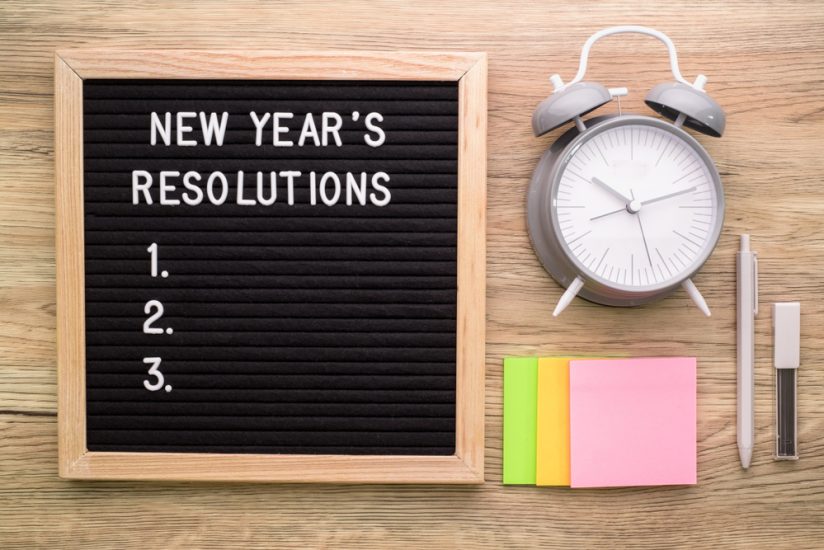
Life is what happens when you’re busy making (and breaking) New Year’s resolutions — with apologies to John Lennon.
How much money would you bet that you’re going to keep your New Year’s resolutions this year?
If you paused, it’s because your track record hasn’t been that great.
Just think of what it will do to your self-respect if you could pull it off.
You know the saying, “Where there’s a will, there’s a way.” In practice, the reverse is more often the case, i.e., “Where there’s a way (that’s easily doable), there’s a will.”
Here are eight ways that will help you to keep your New Year’s resolutions at work:
- Be realistic. Don’t confuse reasonable expectations with realistic expectations. Reasonable means “makes sense.” Realistic means “likely to happen.” It may be reasonable to stop smoking, start a new diet, begin exercising and resolve to be more productive at work, but it may not be realistic to change all of them at once.
- Set specific goals. Most people navigate their way through life utilizing a reverse cognitive bias more than a forward cognitive bias. A reverse cognitive bias means waiting for something to happen and then weighing in how great or crappy it was. A forward cognitive bias looks forward, sets a goal, reverse engineers backs to the present and then acts proactively to achieve it.
- Find a “doable by them” way and people will find the will. For example, one of the most common places that the reverse cognitive bias mentioned above shows up in the workplace is when it comes to meetings. That may explain why they so often have a bad reputation for being unproductive. Too often, meetings happen and then many attendees demonstrate their reverse cognitive bias by privately in their mind and/or between people complaining: “What a waste of time!” “We never stay on task” or “That didn’t accomplish anything” or “Why can’t someone step in and stop x from dominating and ruining the meeting?”
A forward cognitive bias looks forward, sets a goal, is proactive and focuses on how to make a meeting better. For example, the person leading a meeting might send out an email announcement to attendees the day before with the Subject: “PLEASE READ: Making tomorrow’s meeting more productive.”
RELATED: How well do you communicate in meetings?
Then in the body of the email say, “To make tomorrow’s meeting more productive for all of us, please email me a single suggestion (without naming names of particular attendees) of observable behavior that if we follow will improve the meeting. For example, that might be, ‘Everyone will have read the agenda beforehand’ or ‘There will be a mutually agreed upon respectful way to stop someone from talking when they are going on too long,’ etc. I will collect them and read them off anonymously at the beginning of the meeting to keep those suggestions and hopefully to help the meeting be more productive.”
- Write it down. You wouldn’t build a house without a blueprint, would you? Write down what you need to stop doing and what you need to start doing to reach your goals. Writing down your goals and plans increases your commitment.
- Tell other people. Telling other people that you’re going to do something increases your commitment. Select people that you respect and admire, and whose respect you would like to receive and whom you wouldn’t want to disappoint.
- Use the buddy system. Partner with a co-worker who is also trying to keep their New Year’s resolutions to increase your dedication. Stopping negative habits and replacing them with positive behavior is easier when you have a buddy system with a good friend or co-worker. Keeping your New Year’s resolutions with another person reduces the pain of breaking your former routine.
- Eliminate energy vampires. One reason you fall off diets and exercise programs is that you need a quick fix every time you deal with negative people or no-win situations. These can be so exhausting that you say “the heck with” your diet or exercise and grab a candy bar or bail on exercising. Find a way to reduce contact with these people and situations and you’ll dramatically increase your energy and be able to stay on track.
- Stick with it. Realize that it takes 30 days for a change in behavior to become a habit (this may explain why they give out 30-day chips for maintaining sobriety in Alcoholics Anonymous) and six months for a habit to become a natural part of your personality.
One of my New Year’s resolutions is to continually improve the suggestions and advice that I give out in columns like this one to help people become more successful and to enhance their well-being.
Happy New Year to all of you and may it be a productive one at work.
Join the Conversation: Share your New Year’s resolutions and plan to stick with them on our Facebook page.
Dr. Mark Goulston is an award-winning business psychiatrist, a consultant for Fortune 500 companies and the best-selling author of seven books. His latest book, Talking to Crazy: How to Deal with Irrational and Irresponsible People in your Life can be found on Amazon. Catch up on Dr. Goulston’s previous articles here.
Connect with Dr. Goulston through Facebook, Twitter, or LinkedIn. His books are available on Amazon. Check out his videos on YouTube or take advantage of free resources available at www.markgoulston.com.











